



Jacobs. A world where you can.



As climate change threatens water security around the world, more communities are turning to water reuse as a resilient water supply solution and embracing the OneWater principle that all water has value. Jacobs has been supporting clients with water reuse programs for decades, beginning with the first applications of advanced wastewater treatment technologies in the 1960s. We provide our clients with a full range of services, from water reuse feasibility studies to design, construction and operations.



We’ve provided design-build services to the water sector for over 25 years and delivered more than 150 projects. We offer fully integrated design-build and design-build-operate capabilities to tackle the most complex water challenges and work in close collaboration with our clients.



For more than 30 years, Jacobs has been responsible for planning and implementing Lead and Copper Rule-related strategies which protect millions of people in the U.S. and Canada. Our work includes enhanced water quality monitoring strategies, sampling plan development, harvested pipe-scale analysis, lead service line inventories and replacement plans, corrosion control studies and the incorporation of equity and environmental justice considerations into compliance programs.



A curated selection of some of the top-listened to and trending podcast episodes from our popular If/When podcast series.



As a purpose-led company, we know we have a pivotal role to play in addressing the climate emergency. We consider this not only good business, but our duty to channel our technology-enabled expertise and capabilities toward benefitting people and the planet.



We work in partnership, delivering some of the most challenging, diverse and innovative projects and programs globally across multiple sectors. We integrate complex interfaces across planning, procurement and delivery to help unlock better social, environmental and economic outcomes from mega and giga projects.



As our clients navigate the digital transformation and growing cyber risks, we have positioned ourselves at the forefront of this growth, adding digital capabilities, products and tools to serve a growing set of customers.



Sit down with our visionary team of thinkers, dreamers and doers to see what a day in the life is like.



Together with our visionary partner, PA Consulting, we're establishing our position in high end advisory services, creating a springboard to expand in high value offerings beyond the core.


At Jacobs, we're challenging today to reinvent tomorrow by solving the world's most critical problems for thriving cities, resilient environments, mission-critical outcomes, operational advancement, scientific discovery and cutting-edge manufacturing, turning abstract ideas into realities that transform the world for good. With approximately $16 billion in annual revenue and a talent force of more than 60,000, Jacobs provides a full spectrum of professional services including consulting, technical, scientific and project delivery for the government and private sector.



The only certainty about the future is uncertainty. Resilience is an attribute of a smarter planet, and requires planning and adapting ahead of potential threats. We help our clients survive, recover, adapt and thrive.



Jacobs is working to help clients across the United States secure federal funding for projects that make our cities and communities more connected and sustainable. Working hand-in-hand with clients from coast to coast and everywhere in between, Jacobs develops bold, innovative solutions to address the nation’s toughest challenges.



Now more than ever, we appreciate the hard work, sacrifice and dedication of the medical profession in ensuring the health and safety of our communities.



Together, we are stronger. Together, we can transform the future.



Stories that capture our partnerships and innovative impact for a more connected, sustainable world


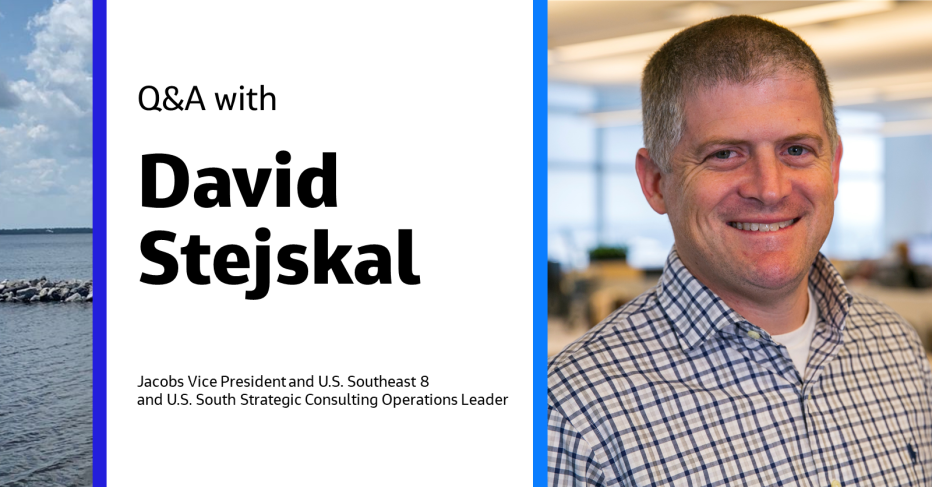
Coastal habitats and communities across the world face profound threats as climate change results in more intense storms and rising seas. To meet these challenges, countries are increasingly turning to nature-based solutions that provide more effective protection against coastal forces than traditional physical barriers, while offering added environmental and societal benefits. These solutions include the restoration of coastal and marine ecosystems like oyster reefs and living shorelines that incorporate vegetation and natural materials to stabilize and protect the shore.
At Jacobs, we’re committed to climate response and we’ve spent decades helping communities around the world mitigate the impact of sea level rise, protect against shoreline erosion, reduce flood risk and restore natural habitats.
In this Q&A, we connect with Jacobs Vice President and U.S. Southeast 8 and U.S. South Strategic Consulting Operations Leader David Stejskal to discuss our partnership with the global non-profit organization The Nature Conservancy. A native of Alabama and a keen angler, David has spent his whole career at Jacobs and he’s led our collaboration with The Nature Conservancy to design nature-based coastal resilience solutions on the U.S. Gulf Coast.
Tell us a bit about your career background and your role at Jacobs.
I've been with Jacobs my entire career – almost 21 years! After graduating with an undergraduate and masters degree in civil engineering from Auburn University, I started with CH2M (now Jacobs) back in 2002 in our Montgomery office, primarily working on water treatment plant and conveyance projects for the Montgomery Water Works and Sanitary Sewer Board. Then, in 2008, I started getting involved in work down on the Florida Panhandle. I'm originally from Fairhope, Alabama, which is on the coast, and the firm wanted to open an office in Pensacola, Florida – so in late 2008, I moved back near home and opened our Pensacola office. It was just me and one other guy when we opened, but we’ve since grown that office to about 20 water practice staff today. After taking on a series of different roles through the years, I now serve as operational lead for the U.S. Southeast 8 and U.S. South Strategic Consulting teams, which means I oversee about 340 staff and about 400 projects throughout the Southern U.S.
Jacobs has been working with The Nature Conservancy on the U.S. Gulf Coast for a decade now. What can you tell us about that partnership?
The Nature Conservancy (TNC) is a leading advocate for nature-based coastal resilience solutions and they’ve done a lot of work in Gulf Coast states and throughout the world to protect communities and habitats from storms and sea-level rise.
We first partnered with TNC in 2012 on a coastal restoration project in Louisiana that they were working on for Shell. Because I was the delivery lead with TNC for that project, I began to meet folks from the organization – including their Gulf Program Restoration Lead who lived across the bay from me in Mobile, Alabama. We struck up a relationship through that initial partnership and we were then selected by the TNC for a master services agreement covering the entire Gulf Coast. Through this collaborative partnership, we’ve worked together on a number of projects, including a living shoreline for the Alabama chapter on the western shore of Mobile Bay which we designed and then installed alongside TNC volunteers. We’ve also done coastal habitat restoration studies in Mississippi, another living shoreline in Mobile and coastal resilience work in Miami and other parts of Florida. Our partnership on the U.S. Gulf Coast has even led to some worldwide collaboration, like connecting our teams in Australia to partner on a restoration project there.
Image courtesy of Russell C. Mick
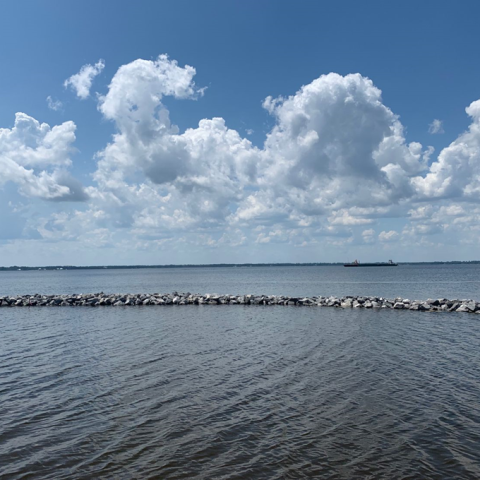
One of the largest projects Jacobs has worked on with TNC is the Pensacola East Bay Oyster Habitat Restoration Project in Florida. What makes that project special?
In 2016 TNC selected Jacobs to manage the monitoring, permitting and design of an oyster habitat restoration project along a 6.5-mile stretch of the Pensacola East Bay. Oyster reefs are one of the world’s most imperiled marine habitats and so the project was designed to install 33 oyster reefs that would help restore a healthy oyster habitat in the Bay. While the primary goal was habitat restoration, the project also offers secondary benefits. Oysters are very effective at filtering water, which improves water quality in the area, and the reefs provide habitats for fish and other aquatic life. The reefs can also mitigate shoreline erosion by dampening waves.
We just finished construction on the project this year and it’s already been wildly successful – we went out about a month ago and we already saw a lot of oysters growing on one of the first reefs that we installed. It’s also been successful because of the close collaborative relationship we’ve had with TNC. We worked through the project’s challenges together and that led to a very vibrant and very positive experience.
Looking forward, TNC wanted this project to be the model for large-scale coastal restoration on the Upper Gulf Coast. The ultimate goal is that it won’t just be government entities funding coastal restoration work but that it will be an option for private landowners to protect their property from coastal forces. Rather than putting in riprap rock or building bulkheads, they can build an oyster reef or living shoreline to provide the protection. I hope this will become a kind of starter flame for other entities to develop these types of projects.
What other work is Jacobs doing with The Nature Conservancy?
We recently partnered with TNC, as well as the University of Florida and Naval Research Lab, to pilot three nature-based coastal resilience solutions at Tyndall Air Force Base, which was severely damaged by Hurricane Michael in 2018.
Jacobs has already been supporting coastal resilience work at Tyndall through the Tyndall Coastal Resilience Working Group – a stakeholder engagement platform for coastal resilience at the Air Force Base and in the region. Our latest work with The Nature Conservancy will pilot an oyster reef, living shoreline and submerged shoreline enhancements at Tyndall to help inform future decision-making around the use of nature-based coastal resilience solutions. The project is being funded by a $4.8 million grant from the Department of Defense’s Readiness and Environmental Protection Integration Program and the National Fish and Wildlife Federation.
To what extent could these experiences with TNC be taken to other geographies?
Our work on the U.S. Gulf Coast is going to hopefully set the stage for future opportunities where we can use our combined knowledge with the TNC to make further impacts on coastal restoration.
At the moment we’re incubating on the Gulf Coast, but these same practices work all over the country – and the world. Everywhere you have a coastal area, you can utilize a lot of the same practices. There will be places where the water temperature or the salinity means that oyster restoration is not the best thing to do, but when it comes to living shorelines or the other processes we’re looking at, especially at Tyndall, those could be applicable wherever there’s water and coastal forces.
“Our work on the U.S. Gulf Coast is going to hopefully set the stage for future opportunities where we can use our combined knowledge with The Nature Conservancy to make further impacts on coastal restoration.”

David Stejskal
Jacobs Vice President and U.S. Southeast 8 and U.S. South Strategic Consulting Operations Leader
If you aren’t working, what would we be most likely to find you doing?
I have a 15-year-old boy and a 12-year-old girl and they are thick into their events at the moment, so you'd probably find me on the field watching my son play soccer or in a studio watching my daughter dance. And if it’s not something related to my kid’s activities, you might find me working on activities for my church – like teaching Sunday school – or you’d find me in the Gulf, with a rod in my hand, fishing.
What advice would you give to young professionals?
Find a mentor. We set up a mentor program this year in my team because I benefited so much from mentors in my career and I think in a lot of places right now, especially in this remote work environment, it can be difficult to find a mentor. One other piece of advice I’ve been providing to young professionals is to be yourself. When you get opportunities to step into a leadership role, whether on a project, at work or in the community, be true to who you are. You have a job to do and someone has probably done it before you, but do it your way – don’t try to copy the guy or gal before you, because they’re not you.
What do you enjoy most about being part of #OurJacobs?
The people. It’s that simple. I’m here because of the people I work with. I enjoy interacting with them, I enjoy seeing them grow – and growing with them – and I enjoy being part of their careers. Day in, day out we get to work with outstanding people that are second to none, and that’s why I’ve been here for 21 years!

Based in our Pensacola, Florida office, David Stejskal has spent his entire career with Jacobs, currently serving as Vice President and Operations Lead for the Southeast 8 and US South Strategic Consulting team. A graduate of Auburn University with his bachelor’s and master’s in civil engineering, David has spent his career serving municipal, state, federal and private clients in the water, wastewater, water resources and coastal arena as engineer, project manager and design lead. Believing in giving back to his profession and community, David currently serves on the American Water Works Association’s Board of Directors, as Chair of the Auburn University Civil and Environmental Engineering Advisory Board, on the Eastern Shore Metropolitan Planning Organization, and as a Sunday School teacher and Deacon in his church.

Sharing a passion for natural infrastructure as a viable way to increase coastal and climate change resilience, The Nature Conservancy and Jacobs collaborate on the Pensacola East Bay Oyster Habitat Restoration Project.
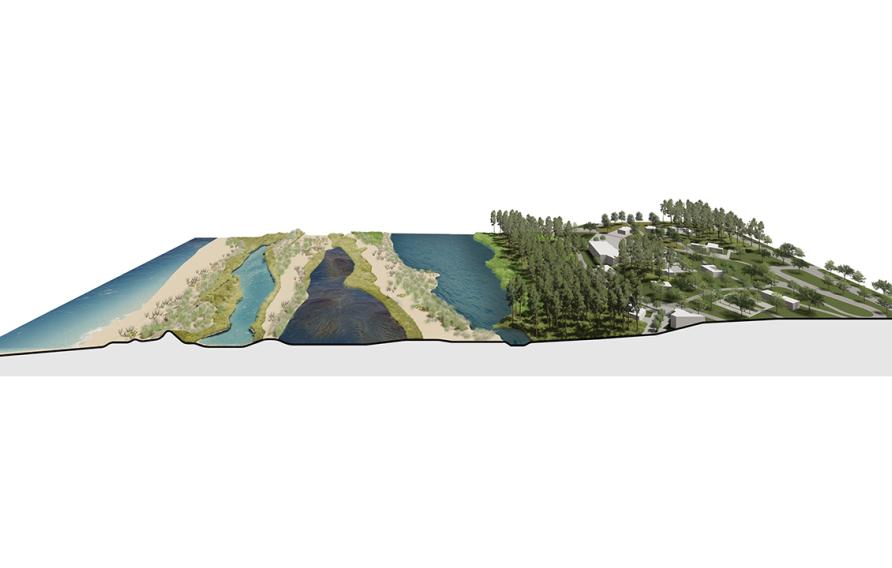
A significant component of ensuring the future resilience of the base is addressing the risks that arise from coastal flooding and erosion. As part of the approach, our Tyndall AFB Rebuild Team is exploring a series of pilot projects that use nature-based solutions to reduce coastal flood risks while creating important social and environmental benefits.
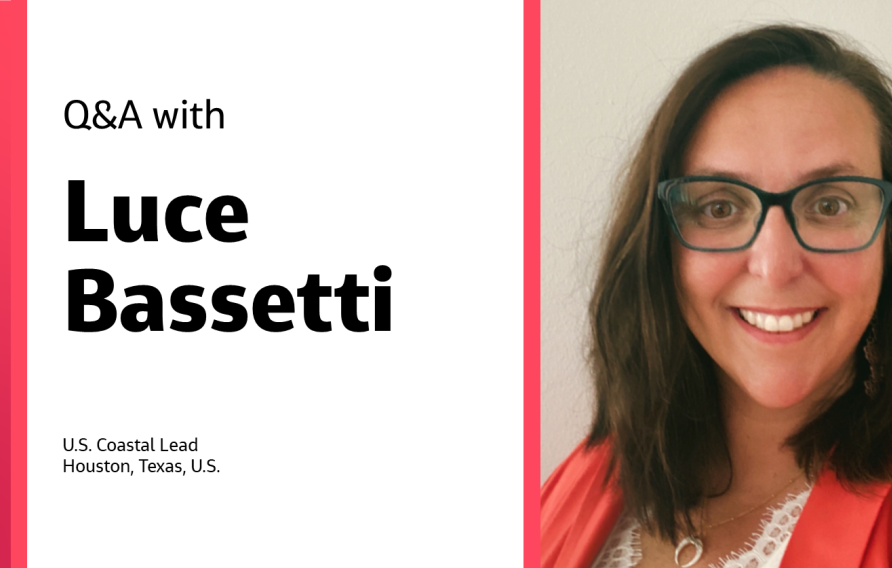
As the lead for Jacobs’ U.S. Coastal Resiliency Program, Luce Bassetti brings a strong background in coastal modeling and resiliency planning, adding extensive international experience to Jacobs’ innovative Gulf Coast team. We sat down with Luce to talk about her work, her home base in Houston and her hopes for the future.
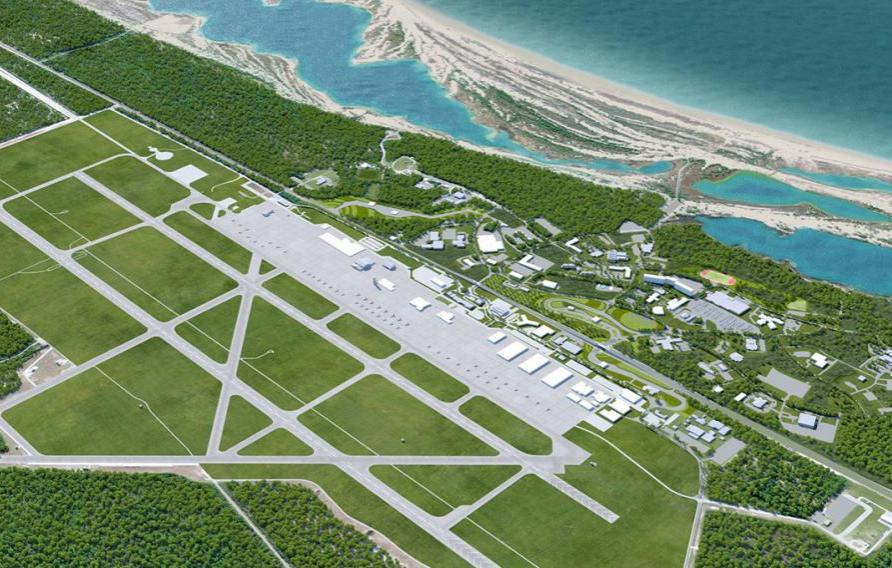
In October 2018, Tyndall Air Force Base (AFB) was hit with a Category 5 hurricane which resulted in damage to 100% of its assets. As a result, they have embarked on a rebuilding program that is focused on creating a resilient, sustainable and smart Installation of the Future that leverages innovative solutions in a “system of systems” approach to perform at the nexus of mission assurance, cost efficiency, and social and environmental sustainability.
What drives you drives us as we work to build a better world – together. At Jacobs, every day is an opportunity to make the world better, more connected, more sustainable. We’re always looking for dynamic and engaged people to join our team. Bring your passion, your ingenuity and your vision.